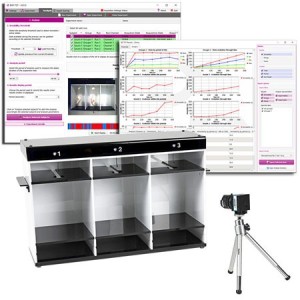Authors
S. Berger, T. Weber, S. Perreau-Lenz, M. Vogt, S. Gartside et al.
Lab
Medical Faculty Mannheim/Heidelberg University, Central Institute of Mental Health, Department of Molecular Biology, Mannheim, Germany.
Journal
Neuropsychopharmacology
Abstract
The association of single-nucleotide polymorphisms (SNPs) in the human tryptophan hydroxylase 2 (TPH2) gene with anxiety traits and depression has been inconclusive. Observed inconsistencies might result from the fact that TPH2 polymorphisms have been studied in a genetically heterogeneous human population. A defined genetic background, control over environmental factors, and the ability to analyze the molecular and neurochemical consequences of introduced genetic alterations constitute major advantages of investigating SNPs in inbred laboratory mouse strains. To investigate the behavioral and neurochemical consequences of a functional C1473G SNP in the mouse Tph2 gene, we generated congenic C57BL/6N mice homozygous for the Tph2 1473G allele. The Arg(447) substitution in the TPH2 enzyme resulted in a significant reduction of the brain serotonin (5-HT) in vivo synthesis rate. Despite decreased 5-HT synthesis, we could detect neither a reduction of brain region-specific 5-HT concentrations nor changes in baseline and stress-induced 5-HT release using a microdialysis approach. However, using a [(35)S]GTP-_-S binding assay and 5-HT(1A) receptor autoradiography, a functional desensitization of 5-HT(1A) autoreceptors could be identified. Furthermore, behavioral analysis revealed a distinct anxiety phenotype in homozygous Tph2 1473G mice, which could be reversed with chronic escitalopram treatment. Alterations in depressive-like behavior could not be detected under baseline conditions or after chronic mild stress. These findings provide evidence for an involvement of functional Tph2 polymorphisms in anxiety-related behaviors, which are likely not caused directly by alterations in 5-HT content or release but are rather due to compensatory changes during development involving functional desensitization of 5-HT(1A) autoreceptors.
BIOSEB Instruments Used
Tail Suspension Test - Wireless (BIO-TST5)
Keywords/Topics
Anxiety; Depression; Stress; Phenotyping; Mood disorders; Cross-disciplinary subjects
Source :
http://www.nature.com/npp/journal/vaop/ncurrent/full/npp201246a.html

 Pain - Thermal Allodynia / Hyperalgesia
Pain - Thermal Allodynia / Hyperalgesia Pain - Spontaneous Pain - Postural Deficit
Pain - Spontaneous Pain - Postural Deficit Pain - Mechanical Allodynia / Hyperalgesia
Pain - Mechanical Allodynia / Hyperalgesia Learning/Memory - Attention - Addiction
Learning/Memory - Attention - Addiction Physiology & Respiratory Research
Physiology & Respiratory Research











![Dynamic Weight Bearing 2.0 – Postural Module [Add-on]](https://bioseb.com/733-home_default/dynamic-weight-bearing-20-add-on-postural-module.jpg)
























 Pain
Pain Central Nervous System (CNS)
Central Nervous System (CNS) Neurodegeneration
Neurodegeneration Sensory system
Sensory system Motor control
Motor control Mood Disorders
Mood Disorders Other disorders
Other disorders Muscular system
Muscular system Joints
Joints Metabolism
Metabolism Cross-disciplinary subjects
Cross-disciplinary subjects CONFERENCES & MEETINGS
CONFERENCES & MEETINGS 